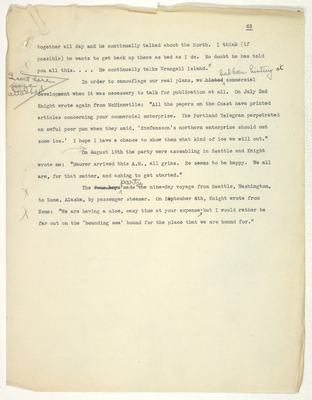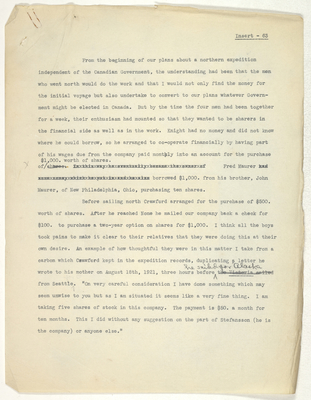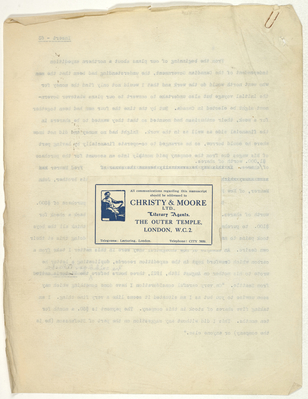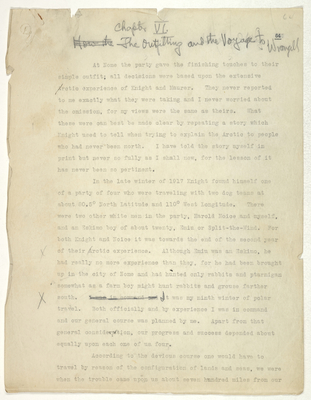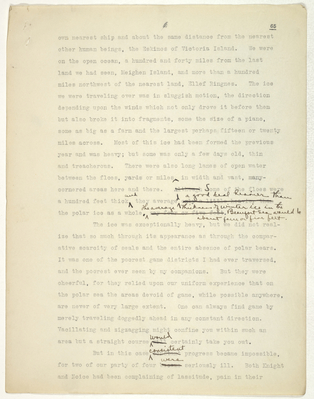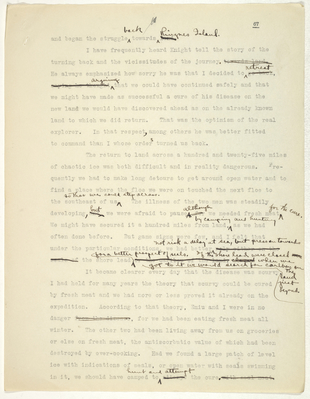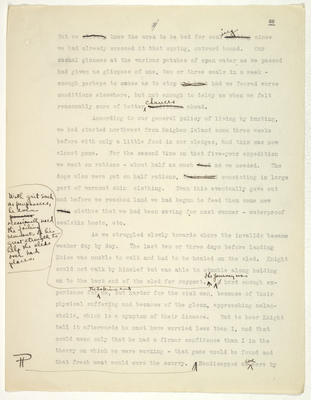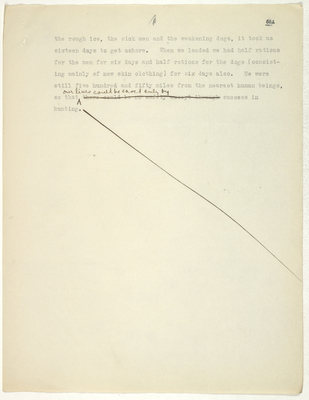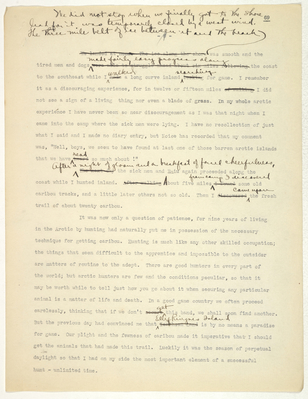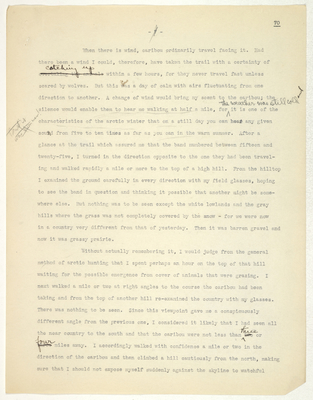Pages That Need Review
stefansson-wrangel-09-27
stefansson-wrangel-09-27-019
63
together all day and he continually talked about the North. I think (if possible) he wants to get back up there as bad as I do. No doubt he has told you all this.... He continually talks Wrangell Island."
In order to camouflage our real plans, we hinted had been hinting at commercial development when it was necessary to talk for publication at all. On July 2nd Knight wrote again from McMinnville: "All the papers on the Coast have printed articles concerning your commercial enterprise. The Portland Telegram perpetrated an awful poor pun when they said, 'Stefansson’s northern enterprise should cut some ice.' I hope I have a chance to show them what kind of ice we will cut."
On August 16th the party were assembling in Seattle and Knight wrote me: "Maurer arrived this A.M., all grins. He seems to be happy. We all are, for that matter, and aching to get started."
The four boys party made the nine-day voyage from Seattle, Washington, to Nome, Alaska, by passenger steamer. On September 4th, Knight wrote from Nome: "We are having a nice, easy time at your expense but I would rather be far out on the 'bounding sea' bound for the place that we are bound for."
stefansson-wrangel-09-27-020a
Insert - 63
From the beginning of our plans about a northern expedition independent of the Canadian Government, the understanding had been that the men who went north would do the work and that I would not only find the money for the initial voyage but also undertake to convert to our plans whatever Government might be elected in Canada. But by the time the four men had been together for a week, their enthusiasm had mounted so that they wanted to be sharers in the financial side as well as in the work. Knight had no money and did not know where he could borrow, so he arranged to co-operate financially by having part of his wages due from the company paid monthly into an account for the purchase $1,000. worth of shares. of/shares In this way he eventually became the owner of Fred Maurer had [SKmExxEHKyxxhiKhxiuExpHkxxnxxKdxtexaixE] borrowed $1,000. from his brother, John Maurer, of New Philadelphia, Ohio, purchasing ten shares.
Before sailing north Crawford arranged for the purchase of $500. worth of shares. After he reached Nome he mailed our company back a check for $100. to purchase a two-year option on shares for $1,000. I think all the boys took pains to make it clear to their relatives that they were doing this at their own desire. An example of how thoughtful they were in this matter I take from a carbon which Ceawford kept in the expedition records, duplicating a letter he wrote to his mother on August 18th, 1921, three hours before he sailed for Alaska the Victoria sailed from Seattle. "On very careful consideration I have done something which may seem unwise to you but as I am situated it seems like a very fine thing. I am taking five shares of stock in this company. The payment is $50. a month for ten months. This I did without any suggestion on the part of Stefansson (he is the company) or anyone else."
stefansson-wrangel-09-27-020b
All communications regarding this manuscript should be addressed to CHRISTY & MOORE LTD., Literary Agents. THE OUTER TEMPLE, LONDON, W.C.2.
Telegrams: Lecturing, London. Telephone: CITY 7659.
stefansson-wrangel-09-27-021
64
Chapter VI. The Outfitting and the Voyage to Wrangell
At Home the party gave the finishing touches to their simple outfit; all decisions were based upon the extensive Arctic experience of Knight and Maurer. They never reported to me exactly what they were taking and I never worried about the omission, for my views were the same as theirs. What these were can best he made clear by repeating a story which Knight used to tell when trying to explain the Arctic to people who had never been north. I have told the story myself in print but never so fully as I shall now, for the lesson of it has never been so pertinent.
In the late winter of 1917 Knight found himself one of a party of four who were traveling with two dog teams at about SO.5° North Latitude and 110° West Longitude. There were two other white men in the party, Harold Hoice and myself, and an Eskimo boy of about twenty, Emiu or Split-the-Wind. For both Knight and Noice it was towards the end of the second year of their Arctic experience. Although Emiu was an Eskimo, he had really no more experience than they, for he had been brought up in the city of Nome and had hunted only rabbits and ptarmigan somewhat as a farm boy might hunt rabbits and grouse farther south. I was in command and It was my ninth winter of polar travel. Both officially and by experience I was in command and our general course was planned by me. Apart from that general consideration, our progress and success depended about equally upon each one of us. four.
According to the devious course one would have to travel by reason of the configuration of lands and seas, we were when the trouble came upon us about seven hundred miles from our
stefansson-wrangel-09-27-022
65
own nearest ship and about the same distance from the nearest other human beings, the Eskimos of Victoria Island. We were on the open ocean, a hundred and forty miles from the last land we had seen, Meighen Island, and more than a hundred miles northwest of the nearest land, Ellef Ringnes. The ice we were traveling over was in sluggish motion, the direction depending upon the winds which not only drove it before them but also broke it into fragments, some the size of a piano, some as big as a farm and the largest perhaps fifteen or twenty miles across. Most of this ice had been formed the previous year and was heavy; but some was only a few days old, thin and treacherous. There were also long lanes of open water between the floes, yards or miles in width and vast, manycornered areas here and there. Although Some of the floes were a hundred feet thick, and the averaged only a little heavier than a good deal heavier than the polar ice as a whole. The average thickness of winter ice in the say four or five feet. Beaufort Sea would be about four or five feet.
The ice was exceptionally heavy, but we did not realize that so much through its appearance as through the comparative scarcity of seals and the entire absence of polar bears. It was one of the poorest game districts I had ever traversed, and the poorest ever seen by my companions. But they were cheerful, for they relied upon our uniform experience that on the polar sea the areas devoid of game, while possible anywhere, are never of very large extent. One can always find game by merely traveling doggedly ahead in any constant direction. Vacillating and zigzagging might confine you within such an area but a straight course would will certainly take you out.
But in this case consistent constant progress became impossible, for two of our party of four were became seriously ill. Both Knight and Noice had been complaining of lassitude, pain in their
stefansson-wrangel-09-27-024
67
and began the struggle back towards land Ringnes Island.
I have frequently heard Knight tell the story of the turning bach and the vicissitudes of the journey. towards land He always emphasized how sorry he was that I decided to retreat go back, saying he thought arguing that we could have continued safely and that we might have made as successful a cure of his disease on the new land we would have discovered ahead as on the already known land to which we did return. That was the optimism of the real explorer. In that respect, among others he was better fitted to command than I whose orders turned us back.
The return to land across a hundred and twenty-five miles of chaotic ice was both difficult and in reality dangerous. Frequently we had to make long detours to get around open water and to find a place where the floe we were on touched the next floe to the southeast of us so that we could step across. The illness of the two men was steadily developing, but and we were afraid to pause although for we needed fresh meat for the cure. We might have secured it a hundred miles from land, by camping and hunting as we had often done before. But game signs were few, and I felt that under the particular conditions, we had better not risk a delay at sea, but press on towards rely either on the scale of the shore land for a better prospect of seals. Or the Caribeu of the land. If the shore lead were closed when we got to it we would search for carabou on the land first beyond.
It became clearer every day that the disease was scurvy. I had held for many years the theory that scurvy could be cured by fresh meat and we had more or less proved it already on the expedition. According to that theory, Emiu and I were in no danger, from the disease we had been eating fresh meat all winter. The other two had been living away from us on groceries or else on fresh meat, the antiscorbutic value of which had been destroyed by over-cooking. Had we found a large patch of level ice with indications of seals, or open water with seals swimming in it, we should have camped to hunt and attemptattempt the cure. with seal meat.
stefansson-wrangel-09-27-025
68
But we already knew the area to be had for sealing hunting since we had already crossed it that spring, outward hound. Our casual glances at the various patches of open water as we passed had given us glimpses of one, two or three seals in a week - enough perhaps to cause us to stop and hunt had we feared worse conditions elsewhere, hut not enough to delay us when we felt reasonably sure of better chances conditions ahead.
According to our general policy of living by hunting, we had started northwest from Meighen Island some three weeks before with only a little food in our sledges, and this was now almost gone. For the second time on that five-year expedition we went on rations - about half as much food as we needed. The dogs also were put on half rations, their food consisting in large part of wornout skin clothing. Even this eventually gave out and before we reached land we had begun to feed them some new skin clothes that we had been saving for next summer - waterproof sealskin boots, etc.
As we struggled slowly towards shore the invalids became weaker day hy day. The last two or three days before landing Noice was unable to walk and had to he hauled on the sled. Knight could not walk by himslef hut was able to stumble along holding on to the back end of the sled for support. With grit such as few [possers], he even possers occasionally used the failing remnants of his great strength to help the sleds over bad places.The journey was hard enough experience for the Eskimos and me, but harder for the sick men, because of their physical suffering and because of the gloom, approaching melancholia, which is a symptom of their disease. But to hear Knight tell it afterwards he must have worried less than I, and that could mean only that he had a firmer confidence than I in the theory on which we were working - that game would be found and that fresh meat would cure the scurvy. Handicapped as we were by
stefansson-wrangel-09-27-026
68A
the rough ice, the sick men and the weakening doga, it took us sixteen days to get ashore. when we landed we had half rations for the men for six days and a half rations for the dogs (consisting mainly of new skin clothing) for six days also. We were still five hundred and fifty miles from the nearest human beings, so that out lives could be saved only by success in hunting.
stefansson-wrangel-09-27-027
69
We did not stop when we finally got to the shore lead for it was temporarily closed by a west wind. The three mile belt of ice between it and the beach We landed at noon. The ice along the shore was smooth and the tired men and dogs were able to struggle ahead about six miles following made fairly easy progress along the coast to the southeast while I walked made a long curve inland searching looking for game. I remember it as a discouraging experience, for in twelve or fifteen miles of walking I did not see a sign of a living thing nor even a blade of grass. In my whole arctic experience I have never been so near discouragement as I was that night when I came into the camp where the sick men were lying. I have no recollection of just what I said and I made no diary entry, but Noice has recorded that my comment was, "We11, boys, we seem to have found at last one of those barren arctic islands that we have heard read so much about!" the sick men and Emiu again proceeded along the
After a night of gloom and a breakfast of foul cheerfulness, The next day the sick men and Emiu again proceeded along the coast while I hunted inland. After walking About five miles from camp I discerned I found some old caribou tracks, and a little later others not so old. Then I discovered came upon the fresh trail of about twenty caribou.
It was now only a question of patience, for nine years of living in the Arctic by hunting had naturally put me in possession of the necessary technique for getting caribou. Hunting is much like any other skilled occupation; the things that seem difficult to the apprentice and impossible to the outsider are matters of routine to the adept. There are good hunters in every part of the world; but arctic hunters are few and the conditions peculiar, so that it may be worth while to tell just how you go about it when securing any particular animal is a matter of life and death. In a good game country we often proceed carelessly, thinking that if we don't secure get this band, we shall soon find another. But the previous day had convinced me that [Ischsen] Land Elly Ringnes Island is by no means a paradise for game. Our plight and the fewness of caribou made it imperative that I should get the animals that had made this trail. Luckily it was the season of perpetual daylight so that I had on my side the most important element of a successful hunt - unlimited time.
stefansson-wrangel-09-27-028
70
- 7 -
When there is wind, caribou ordinarily travel facing it. Had there been a wind I could, therefore, have taken the trail with a certainty of overtaking the animals catching up within a few hours, for they never travel fast unless scared by wolves. But this was a day of calm with airs fluctuating from one direction to another. A change of wind would bring my scent to the caribou; ths silence would enable them to hear me walking at half a mile, for the weather was still cold it is one of the characteristics of the arctic winter that on a still day you can hear any given sound from five to ten times as far as d ou can in the warm summer. After a glance at the trail which assured me that the band numbered between fifteen and twenty-five, I turned in the direction opposite to the one they had been traveling and walked rapidly a mile or more to the top of a high hill. From the hilltop I examined the ground carefully in every direction with my field glasses, hoping to see the band in question and thinking it possible that another might be somewhere else. But nothing was to be seen except the white lowlands and the gray hills where the grass was not completely covered by the snow - for we were now in a country very different from that of yesterday. Then it was barren gravel and now it was grassy prairie.
Without actually remembering it, 1 would judge from the general method of arctic hunting that I spent perhaps an hour on the top of that hill waiting for the possible emergence from cover of animals that were grazing. I next walked a mile or two at right angles to the course the caribou had been taking and from the top cf another hill re-examined the country with my glasses. There was nothing to be seen. Since this viewpoint gave me a conspicuously different angle from the previous one, I considered it likely that I had seen all the near country to the south and that the caribou were not less than three two or four three miles away. I accordingly walked with confidence a mile or two in the direction of the caribou and then climbed a hill cautiously from the north, making sure that I should not expose myself suddenly against the skyline to watchful
